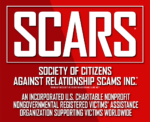SCARS™ Special Report: Official U.S. Airforce Warning
Take Proactive Measures, Research To Prevent Scams
By Senior Airman William Tracy, 50th Space Wing Public Affairs / Published January 29, 2019
Scams Have Been Around Since The Dawn Of Civilization, However, And Thanks To Technology, They Have Grown In Sophistication

An example of a phishing email arrives in an Airman’s inbox at Schriever Air Force Base, Colorado, Jan. 21, 2019. Phishing is a scamming technique in which a scammer tries to lure a user through email into following a link or submitting their personally identifiable information and/or money. It is one of many techniques scammers use to exploit individuals for profit. (U.S. Air Force photo by Senior Airman William Tracy)
Staff Sgt. Kyle Maldonado, 50th Security Forces Squadron investigation section, warns that military members may be targeted as he’s seen an uptick recently.
“Military members are targeted for a variety of reasons,” Maldonado said. “For one thing, we have a steady paycheck which is lucrative to scammers. Additionally, we are trusted members of society, are always moving and may be unfamiliar with an area.”
Among the oldest scamming techniques are false phone calls.
Staff Sgt. Robert Cook, 50th Space Wing safety office occupational safety noncommissioned officer in charge, said callers pretending to offer gifts and prizes, or money of any sort are to be considered suspicious.
“If it seems odd, be very cautious,” Cook said. “If you can determine if the caller is a scammer, forward it to your local police department.”
Cook said the proactive approach towards preventing scam calls is to pay attention to the number of the person calling. Business numbers that start with “1-800” or area codes not from the United States or from a state one has no contacts in can often clue the caller is a potential scammer.
Additionally, Cook recommends call blocking software to stem the tide of potential scam callers.
The rise of online dating has led to military-centric scams that mislead others into thinking they are a real military member or civilian to try to solicit money, often referred to as lonely hearts schemes – schemes which use emotion and romance to lure victims.
According to the FBI, between 2012 and 2016 alone, online romance scams have tripled in frequency. The Federal Trade Commission’s official website warned in an article that “scammers might claim to be service members who can’t get into their accounts overseas or who need money fast. The first sign of a scam is an online love interest who asks for money.”
Cook said to investigate the supposed individual to see if they are who they claim to be.
“These scams are big, especially among younger Airmen,” he said. “It’s important to do your research.”
Maldonado said false emails are another scam to watch out for. Often, email scams ask for one’s personal information and come from unfamiliar addresses. They often try to lure a user into following a link or submitting their information.
He said this technique, known as phishing, has become a prominent threat in recent years.
“Phishing is just another way for cybercriminals to make a profit,” Maldonado said. “Often, they start with the lines ‘dear customer.’ They try to be a legitimate source but they’re not – think before you click and check the email’s security certificates. If it is a suspicious email, send it to your unit’s security manager.”
Other scams include Ponzi schemes, stolen valor, fake charities, faulty investments and more.
Despite how many scams exist, Maldonado said they all focus on one core technique – exploitation.
“They are all looking to use you – and they will almost always ask for money and or personally identifiable information,” he said.
“If it’s too good to be true, it probably is,” Cook added.
Maldonado said general guidelines to follow are to be cautious giving out credit card information, research before spending or investing and always take monetary opportunities with a grain of salt.
“Bottom line – be financially educated and self-reliant,” he said. “Use your head and be conservative with your money.”
Cook said although scams aren’t going away anytime soon, Airmen can always take the proactive approach and gain the upper hand over scammers.
“Be smart, take the right measures and if you are unsure, ask somebody,” he said. “If you do find yourself in a scam consult your leadership. It’s not OK what these people do and they need to be caught. The best way to do that is to protect yourself.”

SCARS™ Team
A SCARS Division
Miami Florida U.S.A.
TAGS: United States Airforce, U.S. Airforce, Scams, Ponzi schemes, stolen valor, fake charities, faulty investments, Fake Soldiers, Romance Scams, Scam Advisory, U.S. Government,
END
– – –
Tell us about your experiences with Romance Scammers in our Scams Discussion Forum on Facebook »
– – –
FAQ: How Do You Properly Report Scammers?
It is essential that law enforcement knows about scams & scammers, even though there is nothing (in most cases) that they can do.
Always report scams involving money lost or where you received money to:
- Local Police – ask them to take an “informational” police report – say you need it for your insurance
- Your National Police or FBI (www.IC3.gov »)
- The SCARS|CDN™ Cybercriminal Data Network – Worldwide Reporting Network HERE » or on www.Anyscam.com »
This helps your government understand the problem, and allows law enforcement to add scammers on watch lists worldwide.
– – –
Visit our NEW Main SCARS Facebook page for much more information about scams and online crime: www.facebook.com/SCARS.News.And.Information »
To learn more about SCARS visit www.AgainstScams.org
Please be sure to report all scammers HERE » or on www.Anyscam.com »
All original content is Copyright © 1991 – 2020 SCARS All Rights Reserved Worldwide & Webwide – SCARS/Romance Scams Now & SCARS/Society of Citizens Against Relationship Scams are all trademarks of Society of Citizens Against Relationship Scams Incorporated (formerly the Society of Citizens Against Romance Scams)
Legal Notices:
All original content is Copyright © 1991 – 2020 SCARS All Rights Reserved Worldwide & Webwide. Third-party copyrights acknowledge.
SCARS, RSN, Romance Scams Now, SCARS|WORLDWIDE, SCARS|GLOBAL, SCARS, Society of Citizens Against Relationship Scams, Society of Citizens Against Romance Scams, SCARS|ANYSCAM, Project Anyscam, Anyscam, SCARS|GOFCH, GOFCH, SCARS|CHINA, SCARS|CDN, SCARS|UK, SCARS Cybercriminal Data Network, Cobalt Alert, Scam Victims Support Group, are all trademarks of Society of Citizens Against Relationship Scams Incorporated.
Contact the law firm for the Society of Citizens Against Relationship Scams Incorporated by email at legal@AgainstScams.org





Leave A Comment